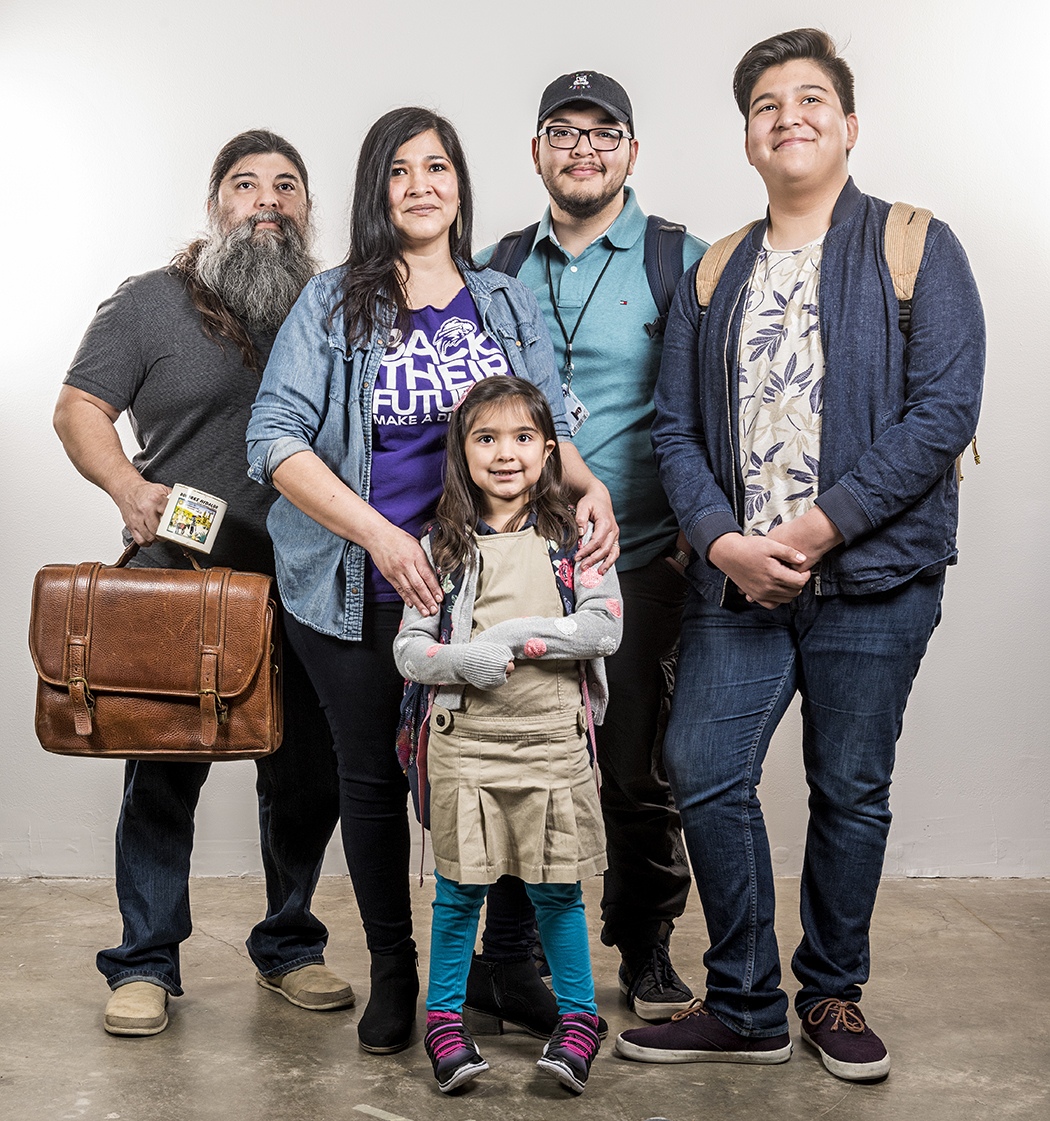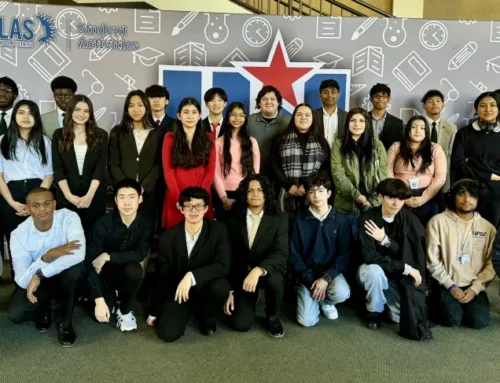
Neighborhood schools have been good to Ermin Macias and Andy Ramirez. Their 7-year-old daughter, Elise, is at Rosemont Elementary, where all their children started. Sons, Elijah, 17, and Noah, 14, chose to leave Dallas ISD’s Booker T. Washington arts magnet for Sunset High School. Oldest daughter, Sophia (not pictured), was last year’s Sunset valedictorian. (Photo by Danny Fulgencio)
SONS RISE AT SUNSET
Andy Ramirez’s oldest son was part of the first group of dual language students at Rosemont Elementary School. When he left after fifth grade to attend Greiner Middle School, other Rosemont parents were surprised.
“Why would you do that? Why would you leave the bubble?” she remembers them asking her. “I thought, ‘Well, but I am that kid. That’s where I came from.’ ”
Ramirez grew up in Oak Cliff and graduated from Sunset High School. “I’ve lived in the same 5-mile radius for 42 years — my whole life,” she says.
Both of Ramirez’s sons now attend her alma mater. They chose it over the Booker T. Washington arts magnet, where the boys were accepted after excelling in the arts academy at Greiner. Her daughter was last year’s Sunset valedictorian and now studies physics at the University of Texas at Austin.
Ramirez wasn’t impressed by her own Dallas ISD education in the ’80s and ’90s. She considered private schools and transferring her children to Duncanville public schools. She even considered homeschooling. But having three kids close in age made those options financially and logistically difficult.
As a result, she joined the group of parents who decided to send their kids to Rosemont and build the school’s reputation.
“We had a group of parents in the neighborhood who decided, ‘This is a good school; it could be better. Let’s do it. Let’s change the dynamic of the school,’ ” Ramirez says. “And we did, and it worked out great.”
The same thing could happen at Greiner and Sunset, she believes.
Part of what scares parents away is “a cultural difference,” Ramirez says. “You’re getting more kids who are just a little bit rough around the edges.” But Ramirez sees an uptick in parents at Sunset who are trying to hold the school accountable.
“The school has come so far from where it was 20 years ago,” Ramirez says. “They’re introducing a lot more with the collegiate [academy], and it’s a great school.”
The collegiate academies launched this past fall, a year after Sunset alumna Claudia Vega took the helm as principal. In addition to the academies, Vega is making changes that allow students who want a traditional, comprehensive high school experience to still pursue college credits.
Ramirez’ daughter’s success in a comprehensive high school — and the fact that she is excelling at UT — was a major factor in her sons’ decision to leave Booker T. for Sunset.
Sunset, Greiner and so many others in Oak Cliff already are “great schools,” Ramirez says. If parents who are opting for private or magnet schools chose neighborhood schools instead, the schools would improve. “I really believe it just requires more parent involvement,” she says.
“I’ve seen it happen,” Ramirez says. “I saw it at Rosemont when I was there. There’s no doubt.”
Hear more from Ramirez’s about neighborhood schools in our podcast, The Uninformed Parent, available at oakcliff.avocatemag.com/podcast.
Sunset high school
by the numbers
1,963
students attend Sunset.
95.3
percent of students are economically disadvantaged.
430
students live in Sunset’s attendance zone but transfer out for other programs, with 260 choosing magnet and academy schools within DISD.
131
freshmen are enrolled in Sunset’s collegiate academies, studying either public health or bilingual education.
90
juniors and seniors are taking college level dual-credit courses at Sunset.
33
college credits can be earned by traditional Sunset students who aren’t part of the collegiate academies, in addition to credits earned with Advanced Placement (AP) tests.
81.7
percent of Sunset students passed their ACP tests last year, compared to 83.7 percent at Woodrow Wilson High School, the comprehensive DISD school with the highest rate.
Sources: Dallas ISD data portal, Sunset principal Claudia Vega
Correction: This article originally stated that 81.7 percent of Sunset students vs. 83.7 percent of Woodrow students passed their AP tests last year.





